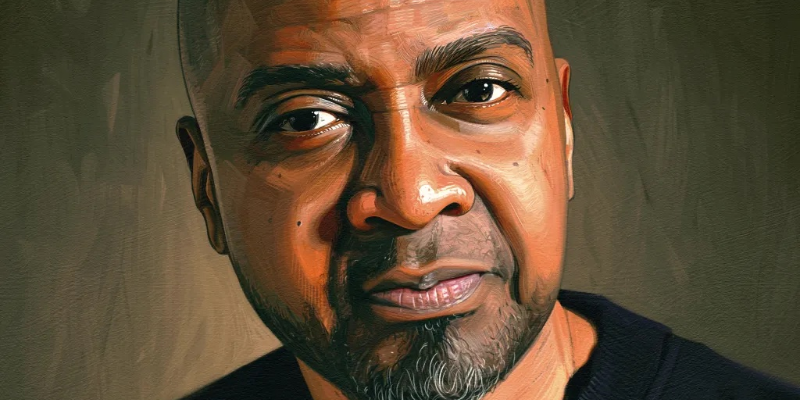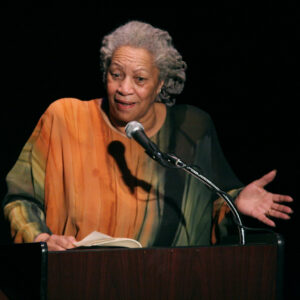
Resmaa Menakem on White Paralysis and the Hope for an Anti-Racist Culture
This Week on the Talk Easy Podcast with Sam Fragoso
Illustration by Krishna Bala Shenoi.
Talk Easy with Sam Fragoso is a weekly series of intimate conversations with artists, authors, and politicians. It’s a podcast where people sound like people. New episodes air every Sunday, distributed by Pushkin Industries.
*
Let’s rewind to summer 2022, when we were joined by author and body healer, Resmaa Menakem. With the release of his new book, The Quaking of America, we discuss Black liberation, the ‘white-body supremacy’ of January 6th, the implications of America’s conservatism, why there’s a failure to communicate across the aisle, the pernicious paradigm that ‘white guilt’ creates, and what it will take for us to have an embodied, anti-racist culture.
On the back half, Resmaa explains a few of the body practices from his new book, how to prepare the nervous system for somatic abolitionism and a potential Civil War. To close, ahead of the midterms, we unpack the blurred lines between Democrats and the GOP, the potential consequences of our conversation, and, ultimately, Resmaa’s hope for liberation.
Subscribe and download the episode, wherever you get your podcasts!
From the episode:
Sam Fragoso: In your book My Grandmother’s Hands from 2017, you wrote:
“While we see anger and violence in the streets of our country, the real battlefield is inside our bodies. Americans have reached a point of peril and possibility. We will either grow up or grow smaller. This trauma will either burst forth in an explosion of dirty pain, or provide the necessary energy and heat for white Americans to move through clean pain and heal.”
In 2022—five years removed from that—do you still believe in that either/or between peril and possibility?
Resmaa Menakem: I’ve always believed that they’re both necessary pieces to grow. I don’t believe particularly white Americans know that there’s anything to grow up through—as it relates to race, collectively. Lately at my book signings and events, I’ve been asking white bodies this question: you literally saw an attempted coup of this country. How many of you went and got weapons training, self-defense, put together a safety plan for you and your family? How many of you saw that and that changed the way you began to teach about culture and history to your children?
Out of all the events, one white person raised their hand. Most white bodies don’t understand the gravity of what happened. I don’t think most white bodies as a collective see this as something that is going to change the way that they live.
SF: And in fact, one major change in you in the last two years, from an interview you did a couple months ago was as you said, “I had the belief that if white bodies got enough information, then they would do something different, but that’s been dispelled. I don’t think information is the curative element.” I read that quote, and I wonder how do we not let that sentiment paralyze the conversation between us?
RM: That’s not my job. The issues is not the paralyzation, or being paralyzed. The issue is, are you going to take what is happening as real energy to be able to transform you towards liberation for your people? Your paralyzation–and your shock–really is an impediment to your own liberation. I’m not trying to get white people to be unparalyzed. I’m trying to get them to actually examine the paralysis, so something new can emerge.
__________________
Resmaa Menakem, MSW, LICSW, SEP, is a leading voice in today’s conversation on racialized trauma. He created Cultural Somatics, which utilizes the body and resilience as mechanisms for growth. As a therapist, trauma specialist, and the founder of Justice Leadership Solutions, a leadership consulting firm, Resmaa dedicates his expertise to coaching leaders through civil unrest, organizational change, and community building. He is the author of the national bestseller My Grandmother’s Hands: Racialized Trauma and the Pathway to Mending Our Hearts and Bodies.
Sam Fragoso is the host of Talk Easy with Sam Fragoso, a weekly series of conversations with artists, activists, and politicians. His writing has appeared in The Atlantic, Vanity Fair, and NPR. After conducting seminal interviews with icons like Spike Lee, Werner Herzog, and Noam Chomsky, he independently founded Talk Easy in 2016.
Talk Easy
Talk Easy with Sam Fragoso is a weekly series of intimate conversations with artists, authors, and politicians. It’s a podcast where people sound like people. New episodes air every Sunday, distributed by Pushkin Industries.



















